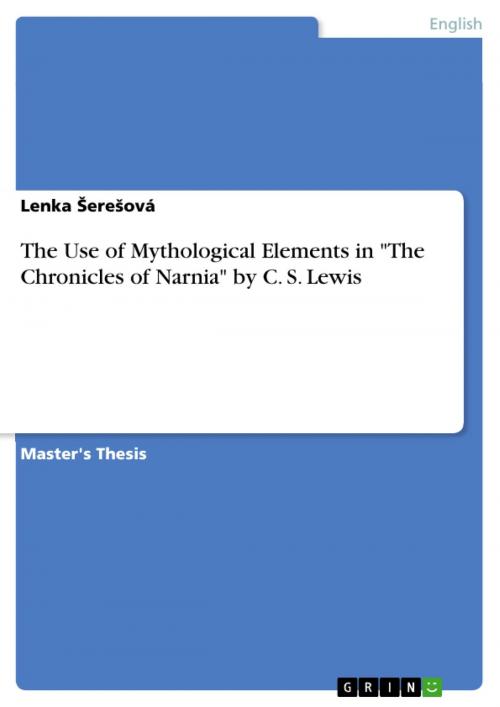The Use of Mythological Elements in 'The Chronicles of Narnia' by C. S. Lewis
Fiction & Literature, Literary Theory & Criticism, British| Author: | Lenka ?ere?ová | ISBN: | 9783668560598 |
| Publisher: | GRIN Verlag | Publication: | November 2, 2017 |
| Imprint: | GRIN Verlag | Language: | English |
| Author: | Lenka ?ere?ová |
| ISBN: | 9783668560598 |
| Publisher: | GRIN Verlag |
| Publication: | November 2, 2017 |
| Imprint: | GRIN Verlag |
| Language: | English |
Master's Thesis from the year 2017 in the subject English Language and Literature Studies - Literature, grade: 1,8, University of Leipzig (Institute for Anglistics), language: English, abstract: The Chronicles of Narnia attract not only children, but also readers past the childhood age group. The story that takes place within the seven books possesses something that is explained by Lewis´s favourite childhood author Robert Louis Stevenson as 'nameless longings'. According to him, the stories, apart from containing realities of life, should provide the reader with something that makes them want more even after the book has come to its end. The main aim of the thesis is to give some of the nameless longings a proper name. The first part is dedicated to analysis of the Chronicles on the basis of Joseph Campbell´s approach to mythology and C.G. Jung´s analysis of archetypes to demonstrate that Lewis´s way of combining different views into one story corresponds with Campbell's theory of Monomyth. The second part addresses Lewis´s own view on mythology and what makes a good myth in accordance with his checklist in An Experiment in Criticism. Additionally, the second part attempts to clarify that Lewis did not draw from the world´s mythology only; the story is also based on a collection of Narnia´s own myths that are passed down throughout its history. The third and the final part of the thesis looks at the Chronicles from the point of view of the Christian myth and the idea that religious myths in general follow a common pattern of a saviour sacrificing himself for the believers in order to save the world from the evil. Furthermore, Lewis´s own views on religion and its influence on writing the Chronicles are discussed.
Master's Thesis from the year 2017 in the subject English Language and Literature Studies - Literature, grade: 1,8, University of Leipzig (Institute for Anglistics), language: English, abstract: The Chronicles of Narnia attract not only children, but also readers past the childhood age group. The story that takes place within the seven books possesses something that is explained by Lewis´s favourite childhood author Robert Louis Stevenson as 'nameless longings'. According to him, the stories, apart from containing realities of life, should provide the reader with something that makes them want more even after the book has come to its end. The main aim of the thesis is to give some of the nameless longings a proper name. The first part is dedicated to analysis of the Chronicles on the basis of Joseph Campbell´s approach to mythology and C.G. Jung´s analysis of archetypes to demonstrate that Lewis´s way of combining different views into one story corresponds with Campbell's theory of Monomyth. The second part addresses Lewis´s own view on mythology and what makes a good myth in accordance with his checklist in An Experiment in Criticism. Additionally, the second part attempts to clarify that Lewis did not draw from the world´s mythology only; the story is also based on a collection of Narnia´s own myths that are passed down throughout its history. The third and the final part of the thesis looks at the Chronicles from the point of view of the Christian myth and the idea that religious myths in general follow a common pattern of a saviour sacrificing himself for the believers in order to save the world from the evil. Furthermore, Lewis´s own views on religion and its influence on writing the Chronicles are discussed.















